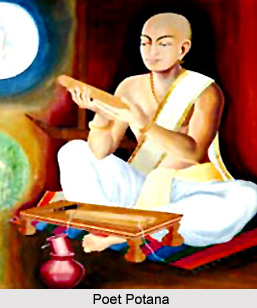 Potana, one of the gems of Telegu Literature, was born in Bammera, a village which is twenty miles away from Warangal, into a Niyogi Brahmin family. He was born to Kesanna and Lakkasanamma. Potana was one of the greatest Telugu poets of the 15th century AD. He was few of the talented poets, who wrote the Mababhogaratatnu, a free rendering of the `Bhagavata Puran` in Telugu. This was placed in high esteem by the expert of Telugu literature. This particular type of writing style is very popular because of it lively poetic content, which can stimulate the devotion of the reader. His full name was Bammera Potana.
Potana, one of the gems of Telegu Literature, was born in Bammera, a village which is twenty miles away from Warangal, into a Niyogi Brahmin family. He was born to Kesanna and Lakkasanamma. Potana was one of the greatest Telugu poets of the 15th century AD. He was few of the talented poets, who wrote the Mababhogaratatnu, a free rendering of the `Bhagavata Puran` in Telugu. This was placed in high esteem by the expert of Telugu literature. This particular type of writing style is very popular because of it lively poetic content, which can stimulate the devotion of the reader. His full name was Bammera Potana.
Potana belonged to a Niyogi Brahmin family of Bammera, Warangal in the state of Andhra Pradesh. Kesanna was his father and his mother was Lakshmamma. According to a popular myth, it is said that Srinatha, another famous Telugu poet was his relative. Potana was a natural scholar, which in Sanskrit known as `Sahaja Panditha`. He was an agriculturist by occupation and very polite by nature and he never hesitated to work as a farmer. At a very young age, Potana composed `Bhogini Dandakam`, a poem in praise of King Sri Singa Bhoopala`s concubine Bhogini. The poetic talents within him were shown by this first poetic venture by him. The second composition of Potana was `Virabhadhra Vijayamu`, which explains the adventures of Lord Virabhadhra, son of Lord Shiva. Here, mainly the Lord Shiva`s destruction of the `yagna` of Daksha Prajapati is described.
Potana was first a devotee of Lord Shiva but later, became a devotee of Lord Rama and got attracted in salvation. There is an ancient myth regarding his conversion from Shaivism to Vaishnavism. It is said that, one early morning during a lunar eclipse, Potana was meditating on Lord Shiva on the banks of Godavari river. Then at that very moment, Lord Rama emerged as king and appealed him to translate Bhagavatam into Telugu and dedicate it to Him. It is believed that this incident encouraged him to translate Vyasa`s Sanskrit Bhagavatam into Telugu. The king of Warangal, Sarvajana Singha Bhoopaala, wanted Pothana to dedicate `Andhra Maha Bhagavatamu` to him. But, Potana refused to obey the king`s orders and dedicated the Bhagavathamu to Lord Rama, whom he worshipped with great devotion. It is said that Potana replied, `it is better to dedicate the work to the supreme Lord Vishnu than dedicate it to the mortal kings. According to him, poetry was a divine gift and it should be utilized for salvation by devoting it to the God.
According to popular belief it is said that Potana wrote a major part of this grand work and his disciples Veligandala Naraya, Ganganarya and Erchuri Singanna also participated in writing some portions of it. This composition by Potana is regarded as `the crown jewel` of Telugu literature.
Potana often used rhythm and repetition of sounds in his special style of writing. He used the alankars (figures of speech) like similes and metaphors very skillfully in his compositions. Poatana also spread the divine knowledge to the Telugu people of Andhra along with the lessons in ethics and politics through his writing `Maha Bhagavatamu`. The main quality of his writing was that even an illiterate Telugu person could remember the verses from chapters `Gajendra Mokshamu` and `Prahlada Charitra` of his composition `Andhra Maha Bhagavathamu`.
Like many other contemporary poets of Potana, he kept himself away from the courts of the kings and led a very simple life. He worked in this earth for sixty years.













